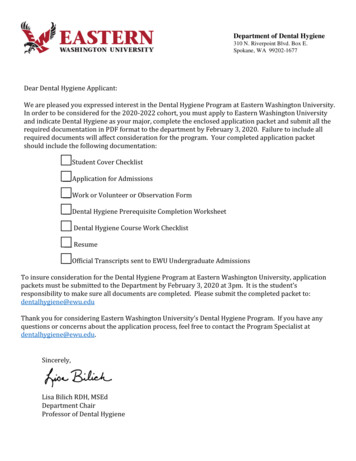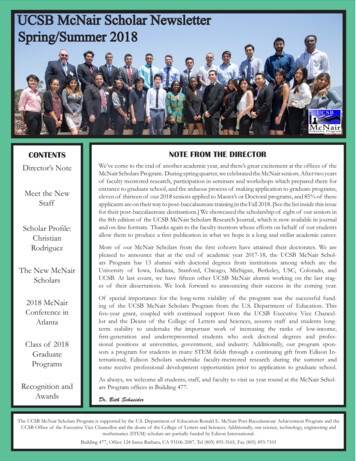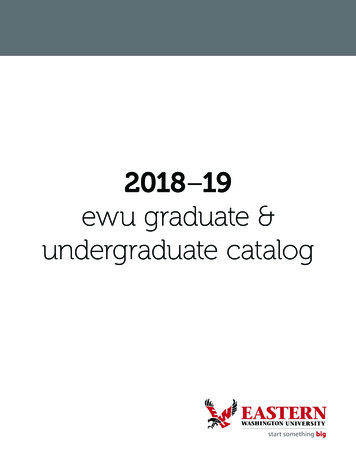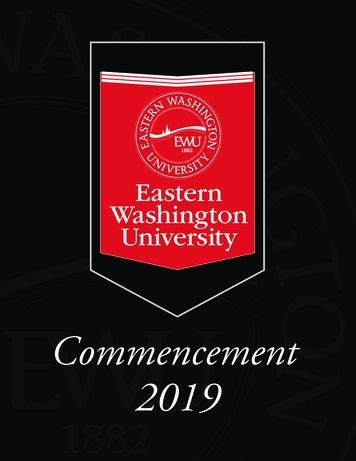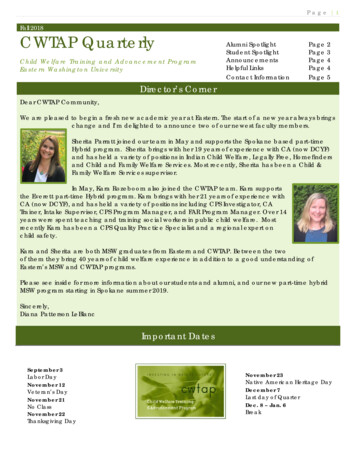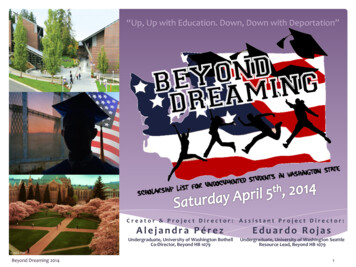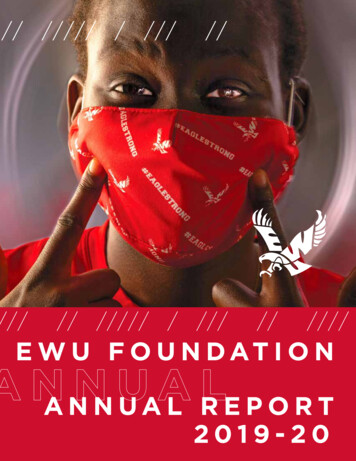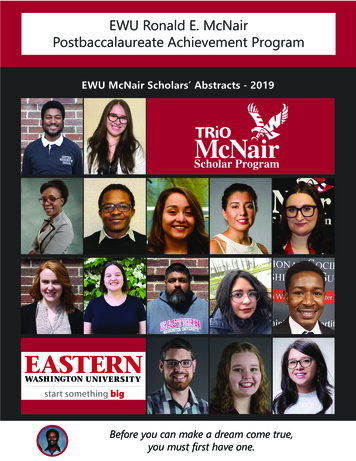
Transcription
EWU Ronald E. McNairPostbaccalaureate Achievement ProgramEWU McNair Scholars’ Abstracts - 2019Before you can make a dream come true,you must first have one.
McNair Scholars Abstract Journal Copyright 2019Ronald E. McNair Postbaccalaureate Achievement ProgramEastern Washington University107 Monroe HallCheney, WA 99004Production of this abstract journal was made possible through funding by the U.S. Department of Education.The McNair Scholars Program is a TRIO Program.
3 of 20McNair Scholar Program StaffWe are a close team of creative professionals at Eastern Washington University who are dedicated to themission of McNair. We provide support, connection, and guidance for EWU’s McNair Scholars as theywork to become scholars and excellent candidates for Masters and PhD programs across the country.Christina TorresGarcía, PhDCynthia Dukich, MFANajeda Patolo, MSBrandon Flatgard, BACori Jaeger, MEdWhat we doThe TRiO Ronald McNair Postbaccalaureate Achievement Program at Eastern Washington University prepareslow-income, first-generation and/or underrepresented minority undergraduates for success in doctoral programsby providing scholarly activities and community engagement that empowers participants to become agents ofpositive change in a culturally diverse world.
From the Director of the McNair Scholars Program4 of 20It is with great pride that I present the McNair Scholars Collection of Research Abstracts 2019-2020! Oneof the most exciting aspects of the McNair Scholar Program is the opportunity for undergraduates toparticipate in research experiences that prepare them for success at the doctoral level. Here you will findthe culmination of intensive research conducted by our McNair Scholars with EWU faculty mentors duringtheir McNair summer research internship and academic year. It also includes the research done by ourEWU McNair scholars who were selected for summer research opportunities outside Eastern at MIT, FredHutchinson, and the University of Notre Dame.Since the first EWU McNair grant in 1995, McNair has worked closely with Faculty to build a research centeredcommunity where students thrive in their pursuit of their Ph.D. and careers in university. Mentors are at theheart of what McNair facilitates for our scholars. While the role of advisor is usually focused on guidingacademic progress, the significant commitment of our EWU McNair mentor’s is centered on advancing thestudent’s career through an interpersonal engagement that provides guidance while sharing experienceand expertise. EWU McNair faculty mentors take this role seriously in the development of a future researchcolleague, especially for first-generation and low-income students with unique needs and unique rewards.McNair is always looking for mentors who match the student’s research interests, discipline and learningpreferences, as well as faculty who are available during the summer and willing to commit to supporting thescholar throughout the research internship and their continued academic path.If you are interested in mentoring McNair students and assisting in developing the new generation ofscholars, please nominate a student who you would like to work with for the McNair orientation during thefall quarter by sending an email to me or using the McNair nomination card. Also, potential applicants willbe completing a faculty interview assignment, and this is an opportunity for you to share your desire tomentor them in a research project. Our quest is to continue and extend our partnership with EWU McNairmentors and collectively support the transformation of our students.The rewarding aspects of teaching and mentoring first-generation, low-income students are priceless. Wehave worked diligently to run one of the most prestigious and successful programs at EWU and one ofthe top programs in the region. In addition to the faculty-mentored research project, McNair scholars alsoparticipate in a series of seminars to support their academic development.Winter: Building Scholarly IdentitySpring: Research MethodsSummer: McNair Research InternshipFall: Graduate School Application ProcessMcNair utilizes a collaborative class setting, as well as personalized needs assessment and one-on-oneacademic coaching. Canvas modules for each seminar enhance face-to-face teaching by giving an overviewof such things as how to write an annotative bibliography, develop and complete a research proposal,conduct a literature review, and formulate research methods. Seminars also emphasize elements ofanalytical writing. In addition to facilitating seminars, McNair staff support all elements of the graduateschool application process as well as prepare scholars to seek out academic conferences, submit travelgrants, apply for Summer Research Internships and graduate fellowships, such as NSF and Ford, along withother scholarships.I want to thank the people who work behind the scenes to sustain the McNair program, especially toour McNair Staff: Cynthia Dukich, Najeda Patolo, Cori Jaeger, and Brandon Flatgard, for working diligentlyin advising and guiding students to success. I also want to thank the Writer’s Center and the wonderfulScholars’ Cafe speakers. I am incredibly grateful to all of you.Christina Torres García, MBA, PhDDirector of the McNair Scholars Program
5 of 20Halim AcostaApplication of Space Filling Curves to The Dynamic Mobility on Demand ProblemRide-sharing (also called Car-pooling), by having more people using one vehicle, may reduce each person’stravel costs such as fuel, tolls, and the stress of driving. Ride-sharing is also a more environmentallyfriendly and sustainable way to travel as sharing journeys reduces air pollution, carbon emissions, trafficcongestion, and the need for parking spaces. A ride-sharing system dynamically optimizes the process ofdispatching riding providers to serve a set of riding requests, in attempt to minimize parameters, such asoverall travel distance waiting time, for a large geographical region. Many challenges are confronted inthe current research. First, the system is stochastic since riding requests can be made at any random timeinstant, which forces the system to recalculate the dispatching scheme constantly once a new group ofrequests are made. Second, the system must find the optimal solution based on a large volume of data,including a large set of ride requests, providers, and a large volume of geographical map data. Third, thesystem must find the optimal solution for all providers and requests in a real-time manner. Space fillingcurves have the property of mapping n-dimensional data onto 1-dimension and consequently turns itinto a one-dimensional problem. Given this property, we apply it to the problem of efficiently routing afleet of vehicles to a set of requests such that we minimize the total cost of service. In this study, we find anoptimized dispatching scheme for the mobility on demand problem that works to minimize overall traveldistance and waiting time for a large city such as New York. To do so we explore the locality preservingproperties of space filling curves and their ability to map multi-dimensional data to a single dimension.We use the existing big data set that is provided on the website of the New York city taxi public datasetto test and verify our system.TRIO McNair Faculty Research Mentor Dr. Yun Tian (Tony)is an Associate Professor of Computer Science at EasternWashington University. His research interests include Grid andCloud computing, parallel computing, GPGPU computing andBig Data.
6 of 20Madelyn BrownMaintaining Our Land: Traditional Ecological Knowledge and Wildfire PreventionFor over 100 years, Euro-American strategies devised and implemented in the western United Stateshave contributed to the exponential increase in wildfires. By enforcing suppressive measures to disruptthe natural fire regimes, U.S. fire management agencies changed forest structures, wildfire severity, andprevious preventative methods utilized by Indigenous peoples in the Northwest. Heavily influenced bypast policies and Eurocentric beliefs, the continued tactics used to eliminate wildfires from ecosystemshave instigated a greater occurrence of fires throughout our western forests as burnable fuels growrampant. Taking into account the historic discrimination against Traditional Ecological Knowledge andits benefits in forest—and wildfire—management, I propose that these care techniques, specifically theacceptance of fire as a viable influence in forest health, should be taken into consideration when utilizingpreventative measures against human-caused events.TRIO McNair Faculty Research Mentor Dr. Christina TorresGarcía is the Director of the McNair Scholars Program atEastern Washington University. Her research interests focus onhistorical, social, and political issues affecting Chicanas/Latinasin the Pacific Northwest.TRIO McNair Faculty Research Mentor SimHayKim S. Jack is alecturer for American Indian Studies at Eastern WashingtonUniversity and a PhD student at UC Davis in the Department ofNative American Studies.
7 of 20Miriam CarlsonCOGNITIVE APPRAISAL AND DEBT AVERSIONThe Effects of Cognitive Appraisal on Postsecondary EducationFew studies have gone beyond evaluating the students’ socioeconomic status and how their statusinfluences academic achievement in higher education. While previous research makes an attempt toaddress the notions surrounding attrition, retention, and persistence the findings are more multifariousthan previously assessed. Therefore, the purpose of this study is to examine the concept of cognitiveappraisal in relation to higher education. The study seeks to evaluate how the appraisal of perceivedbarriers, mainly debt aversion, influences individual resolutions to pursue and complete higher levelsof education. Using a qualitative, correlational design, the researcher examines the differences betweenthe perceptions of traditional and nontraditional students. The researcher hypothesizes the following: (1)Individuals who make positive appraisals are more likely to complete their undergraduate program, and ifneeded, obtain a graduate degree; and (2) individuals who are debt-averse may not consider the benefitsof higher education, resigning themselves to lower-paying jobs and fewer opportunities. The researchwill help further our understanding of the role cognitive appraisal plays in debt aversion in nontraditionalindividuals, which can ultimately point to potential avenues for intervention. Research in mental processesthat impact decision making is critical because as a society, it behooves us to find a way to challengeadverse mental processes (such as negative appraisals) of nontraditional students to better level theplaying field for future education and career participation.TRIO McNair Faculty Research Mentor Dr. Aryn Ziehnert is aLecturer in the Pyschology Department at Eastern WashingtonUniversity. Her research interests include childhood adversity,early maladaptive schemas, stigma, and shame.
8 of 20Malachi ChukwuEconomic development in the Global South: A case study of Niger Delta, NigeriaAlthough President Truman promised to invest in the economic development of the whole world in 1949,the Global South remains trapped in its abject poverty. For the last seven decades, the extant Eurocentricliterature produced by mainstream scholars of economic development has promoted several prescriptivemodels presumably designed to improve the standard of living for people living in the Global South.With every new model, the Global South has been coerced into adopting such models. Tragically, thesemodels have all failed mostly at the expense of people of the South. And with each failure, a differentset of prescription has been offered and pushed. The long-term effects of such models have not shortof immense capital accumulation for multinational corporation in the Global North and increasing (inabsolute term) poverty, pollution, political instability, inequality, and social fragmentation for the GlobalSouth. After reviewing this background, this paper focuses on the pervasive stage of underdevelopmentin Niger Delta and examines the failed policies of Eurocentric models of development that have helpedcreate human insecurity, political instability, environmental disaster, and social fragmentation. Employinga qualitative analysis of the extant literature on the role of multinational oil companies in Niger Delta,the paper reviews such failed policies. As a case study of insecurity in Niger Delta, the paper relies onscholarship produced by critical scholars, such as Esteva, Babones, and Babcicky Cyril Obi, Tarila MarclintEbiede, Philip McMichael and Tombori Bodo to make its assessment and make its final conclusion.TRIO McNair Faculty Research Mentor Dr. Majid Sharifi is theDirector of International Affairs and an Associate Professorin the Political Science Department at Eastern WashingtonUniversity. His research interests include nationalism, securityand insecurity, and violence and inequity.
9 of 20Rosa Espinosa ZunigaGratitude, Spirituality, and Religiosity as predictors of psychological well-beingin Latinx Aging PopulationThe purpose of this study is to test if there is a correlation between the level of spirituality, religiosity andthe mental health of elders. Research has attributed the fluctuation in the mental health of older adultsnot only to spirituality, religiosity, meaning in life and gratitude but also to the physical health. A studythat shows the correlation between the involvement in religious activities, having a clear meaning in life,and the level of spirituality displayed by the elders in institutionalized care or community living with themental health that they show throughout their aging process.The views of what encompasses mental health or whether or not an individual need to receive therapyor any kind of anti-depressive drugs to assure that they will continue to have a progressive aging processis shown to be different from culture to culture. This study will employ the gratitude questionnaire,satisfaction with life scale, and the meaning in life for the purposes of showing the way these affect theperception of mental health and the mental well-being of elderly from different cultural/ethnic groups.TRIO McNair Faculty Research Mentor 2019 Dr. Theresa Martin isa Professor in the Pyschology Department at Eastern WashingtonUniversity. Her research interests Social Psychology with anemphasis in Health Psychology and Intimate Relationships(including LGBTQ , Gender, and Sexual Orientation).TRIO McNair Faculty Research Mentor 2018 Dr. Phillip Watkinsis a Professor in the Pyschology Department at EasternWashington University. His research interests include howgratitude enhances happiness and wellbeing and the nature ofjoy and its relationship to well-being.
10 of 20Angelica Garcia-MaciasThe Latiné vote, representation through whitenessThe Latiné demographic is estimated to surpass 30% of the United States population by 2060 (Taylor,P. 2013). Our political institutions will inevitably be shaped as the electorate demographic changes.However, the Latiné community has varying identities and this project captures their turnout based onthe identity of whiteness. This MIT Summer Research Program project will analyze the voting behaviorof Latiné turnout based on family income in order to understand the potential impact of their politicalbehavior built on the US Census Bureau identification data . Furthermore, this project reflects state bystate voting turnout. Simultaneously, Critical Race Theory is utilized to outline the voting behavior withinthe Latinx community and formulate the methods used in this investigation. The mixed methods that areincorporated are the statistical reviewal of previous voting records using the language Stata to audit theUnited States 2014 and 2018 midterm elections. Those that did not identify as white, but Latiné have adecrease rate of voting turnout versus Latine that is white identifying. Yet, the limitations presented inthe research is the small sample size that is used to represent the Latiné community. The pan-ethnic labelminimizes the experiences that occur within the Latiné community.Research Mentor Dr. Charles Stewart III is a Kenan SahinDistinguished Professor of Political Science at MIT. His currentresearch about Congress touches on historical developmentof committees, origins of partisan polarization, and Senateelections.
11 of 20Darlene GilroyChemical Weathering of the Sediments Deposited by the 1980 Mt. St. Helens Eruptionand its Effect on Stream Water ChemistryThe chemical weathering of the volcanic sediments deposited by the 1980 Mt. St. Helens (MSH) eruptionwas investigated using a sequential leaching process. The following three leachates were used to simulatechemical weathering:ultra-pure water (H2O), 1 N acetic acid (CH3COOH), and 1 N nitric acid (HNO3). Theaim of the study was to determine the relative resistance of MSH rock types to chemical weathering.This was done through evaluation of the chemical composition of individual leaches analyzed using aninductively coupled plasma optical emission spectrotrometer (ICP-OES).TRIO McNair Faculty Research Mentor Dr. Carmen Nezatis a Professor of Geology at Eastern Washington University.Her research interests include water and soil geochemistry,biogeochemistry, mineral dissolution, and environmental gelogy.
12 of 20Theresa LeePrisoner Reentry:College Perceptions of Reentry Barriers in a Northwest CommunityThe United States has experienced an enormous rise and fall in crime rates, while incarceration rates havecontinued to soar. One of the many pressing concerns about the era of mass incarceration, especially intimes where decriminalization of drug offenses occurs, communities are faced with increases in returninginmates and resources needed for successful reentry. This study is focused on community perceptions ofcollege students toward barriers faced regarding incarceration, prisoner reentry, and improving recidivismrates in communities. Qualitative data are collected from interviews and focus groups conducted inan Inland Northwest community, to shed light on the community’s perception of barriers to reentrythat might interrupt successful reentry for inmates or that may be viewed as more helpful for inmates’successful reentry. This research extends our understanding of community perceptions of barriers facedin interrupting the cycles of incarceration as well as provides an assessment and evaluation of what exists,what is needed, and what has worked in this community. The research has implications for local criminaljustice reform efforts to better provide services and resources for returning inmates.TRIO McNair Faculty Research Mentor Dr. Lindsey Upton is anAssistant Professor of Sociology at Eastern Washington University.Her research interests include social justice, gender and crime,homelessness and poverty, and public policy.
13 of 20Lily Ann LongA Thematic Analysis of First-Generation Students’ Experiences of Shame in UniversityThe purpose of this study was to explore first-generation students’ experiences of shame as theyrelate to academic contexts, with the intention of furthering the discussion about effective universityinterventions. Sohn’s (1977) model of ‘morally un/neutral affects’ was considered to demonstrate thatattributions of academic performance to shame often have significant affective impacts. Brown’s (2006)Shame-Resilience Theory (SRT) was also considered to demonstrate how experiences of shame affectmarginalized individuals. In this study, 7 first-generation, undergraduate students at Eastern WashingtonUniversity participated in semi-structured interviews. These interviews consisted of 11 questions andlasted approximately 90 minutes. A thematic analysis of transcripts identified themes of shame related tofeelings of institutional connectedness, access t
We are a close team of creative professionals at Eastern Washington University who are dedicated to the mission of McNair. We provide support, connection, and guidance for EWU’s McNair Scholars as they work to become scholars and excellent candidates for Masters and PhD programs across the country. Christina Torres García, PhD
